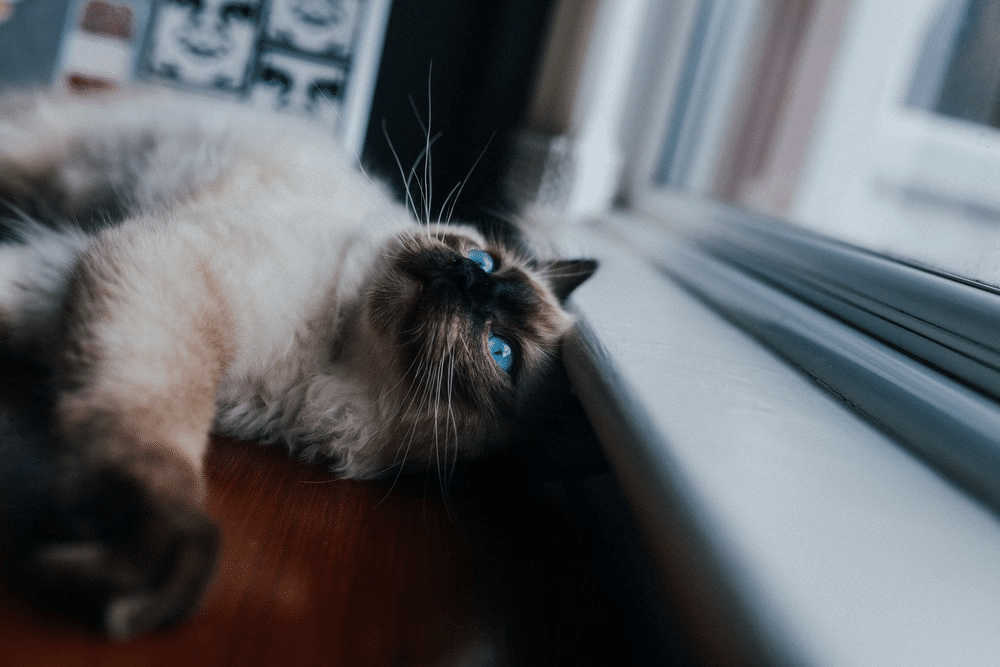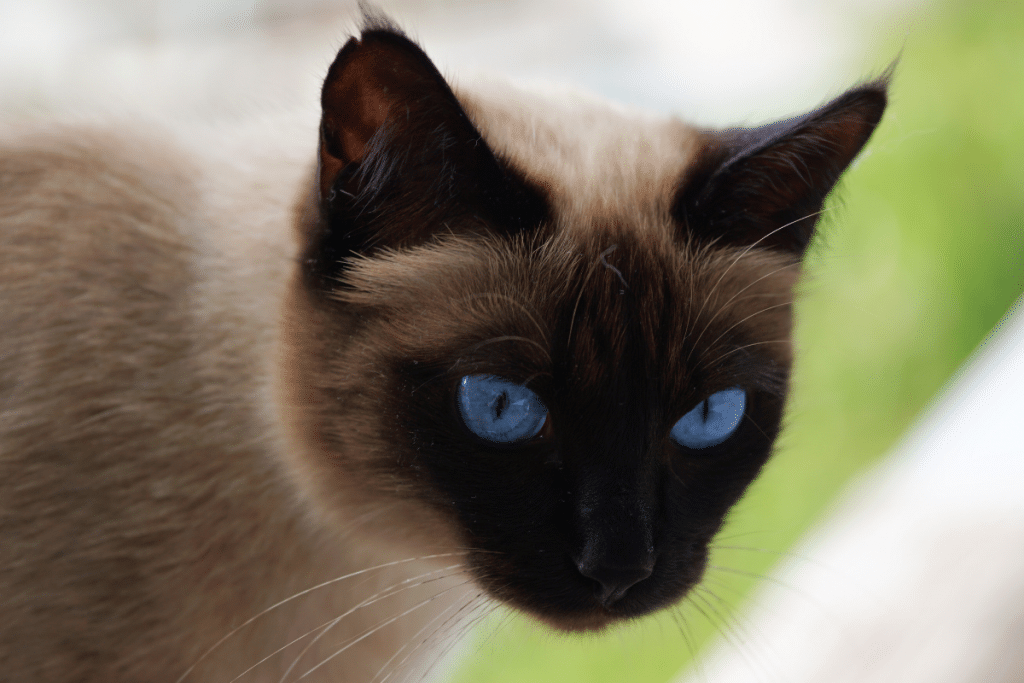Siamese cats are one of the most popular and oldest breeds of cats in the world. They can live longer than other cat breeds, and like any other purebred, Siamese cats are prone to developing certain genetic conditions. Given their genetic makeup and longer life expectancy, Siamese cats are more prone to developing certain health issues.
Let’s look at some of the common health issues experienced by Siamese cats.
Behavioral and Mental Health Problems
Siamese cats are naturally playful and social cats. They thrive on the company of other humans and cats; however, they are more prone to developing mental health problems that stem from loneliness and boredom when left alone for more extended periods.
Feline Psychogenic Alopecia
Perhaps the most common way an anxious Siamese will cope with anxiety and boredom is by developing an obsessive disorder called psychogenic alopecia. The cat obsessively grooms itself by licking, and the excessive licking can cause bald spots on the skin.
Excessive licking of hair can also cause other health conditions, particularly intestinal problems such as trichobezoars and hairballs.
Feline Hyperesthesia Syndrome
Another skin condition that can be caused by excessive licking of skin is the Feline Hyperesthesia Syndrome. When a cat spends a lot of time over-grooming itself and obsessively licking the skin, it can break the skin cells and form raw bleeding patches.
Gums and Mouth Diseases
Like other cat breeds, Siamese cats are also known to suffer from gum and mouth diseases throughout their lifetime.
Gingivitis
Poor oral hygiene and the genetic makeup of Siamese cats make them more prone to developing gum problems such as gingivitis. When food and other minerals accumulate along the gum line, this can lead to a build-up of tartar. If not treated well in time, the condition can lead to gingivitis.
Furthermore, small space pockets start to form in between the gums as well as the teeth, which eventually become the breeding ground for bacteria and germs. If left untreated, the condition can lead to a more serious gum and mouth disease called periodontal disease. It is a serious concern as the issue can cause the bacteria to spread from the gums and infected teeth to the entire body and damage the liver and kidney over time.
Eye Problems
Your Siamese cat might be prone to developing several eye problems. Some of the common eye problems found in Siamese cats may include:
Strabismus
Strabismus is an eye condition in which the eyes do not align properly with each other. In fact, the eyes are oriented in more than one direction. While the condition does not affect the cat’s ability to see objects, it is a more visual concern related to the Siamese cat’s eyes.
Nystagmus
Another common health issue found in Siamese cats is nystagmus, which is a vision condition associated with uncontrolled eye movements. You may notice that your cat’s eye starts shifting up and down or from right to left. As soon as you notice such eye deviations in your Siamese cat, it is best to visit the vet as soon as possible. While it is an eye condition, it can often be a sign of something more dangerous, such as kidney or heart problems.
Progressive Retinal Atrophy
One of the most terrible eye conditions that affect the Siamese cat is progressive retinal atrophy. The illness affects the retina and if left untreated, it can lead to blindness over time. Retinal atrophy is caused by a defective gene that is passed from one generation to another and damages the light-receiving cells at the back of the eyes. As a result, the condition leads to night blindness which eventually progresses to complete blindness.
Given the advances in technology, the condition can be detected early on through DNA tests. These tests can indicate whether the cat is affected by the condition or is a carrier of the gene. Moreover, you can also identify cats that are free from the gene altogether. To control the spread of the condition, cat breeders only allow cats that are free of the defective gene to reproduce.
Vestibular Disease
A genetic condition that is common among Siamese cats isvestibular disease. The condition affects the vestibular system found in the inner ear that controls the spatial orientation and body balance. As a result, cats with vestibular disease will experience a loss of balance which often resonates in symptoms such as head tilting, disorientation, and dizziness.
While it is usually a minor problem, and the issue often subsides on its own, if it is a persistent concern that does not get better over time, it’s always best to consult a vet.
Kidney Problems
Siamese cats are also more prone to developing kidney problems, including infections, tumors, and blockages. Since the kidney is an integral organ of the body that eliminates waste product present in the blood, any issue with the kidney can negatively affect the entire body.
Moreover, the kidneys of Siamese cats are fragile and can deteriorate over time and lead to chronic kidney illness. It is best to regularly visit your vet with your Siamese cat to rule out any potential problem with your cat’s kidneys.
In some cases, your cat might not be experiencing any symptoms, but the kidneys would have affected, and the vet would recommend flushing treatment along with recommended dietary changes. While the damage to the kidney cannot be reversed, it can still be managed with adequate treatment and medications.
Respiratory Tract Conditions
Siamese cats are also more likely to experience respiratory tract conditions which are quite similar to common cold and flu among humans. Some of the respiratory tract conditions common among Siamese cats are
Upper Respiratory Infection
The condition is caused by one of the two common pathogens including calicivirus and Feline rhinotracheitis virus.
Calicivirus lasts around a week and leads to nasal and eye discharge. Moreover, it can also cause ulcers around the mouth and nose and lead to aches and pain in the body. The other pathogen that causes respiratory tract infection is the feline rhinotracheitis virus that causes an infection that can last anywhere from two to four weeks. When the virus infects your Siamese cat, you will often find them sneezing and drooling. However, with regular vaccines and by providing a clean indoor environment, you can reduce the likelihood of respiratory tract infections.
Respiratory tract conditions are more common among younger Siamese cats. As your cat gets older, the risk of getting respiratory tract infections to decrease.
Other Common Health Issues
Siamese cats are also prone to several other health conditions, including
Porphyria
Porphyria is another complicated genetic condition that affects the cat’s metabolism. The problem with porphyria is that it is complicated to diagnose, as it can affect different organs and can cause varying symptoms. The genetic condition modifies the enzymes that control the production of hemoglobin.
As a result, the condition can cause varying symptoms that are often confused as an indication of other diseases. Some of the common symptoms of porphyria include skin disorders, red urine, and convulsions. In some cases, the condition can also be asymptomatic, making it even more challenging to diagnose the condition.
Hydrocephalus
Siamese cats are also more prone to developing a condition known as hydrocephalus. This condition causes the accumulation of spinal fluid in the brain, which exerts pressure on the brain and may cause irreversible damage to the delicate organ. Again, this health condition is caused by the genetic alteration in Siamese cats. The most obvious symptom of the condition is the swelling of the head. As soon as you notice any swelling around your cat’s head, it’s best to visit a vet immediately.
Breast Cancer
It might come as a surprise to many pet parents, but Siamese cats are also more prone to developing breast cancer, which tends to affects older, female Siamese cats. The condition typically resonates as a breast cyst that can be benign or become cancerous over time.
For this reason, it is essential to keep a check on any cysts that your older Siamese cat develops and visit your vet regularly. In case of a malignancy, your vet may recommend surgical removal of the cyst and proceed with the treatment.
Wrapping it Up!
Siamese cats tend to live longer than most other cat breeds. They provide great company and have overall decent health, but you may have noticed that most of the common health issues highlighted above are a result of defects in the genetic line of the cat. Thus, you must adopt your favorite Siamese cat from breeders or shelters that have a good reputation and offer guarantees.
Do you have more concerns about how long do Siamese cats live? Check this article where we discuss this more thoroughly: How Long Do Siamese Cats Live? Top Longevity Factors Overview.



